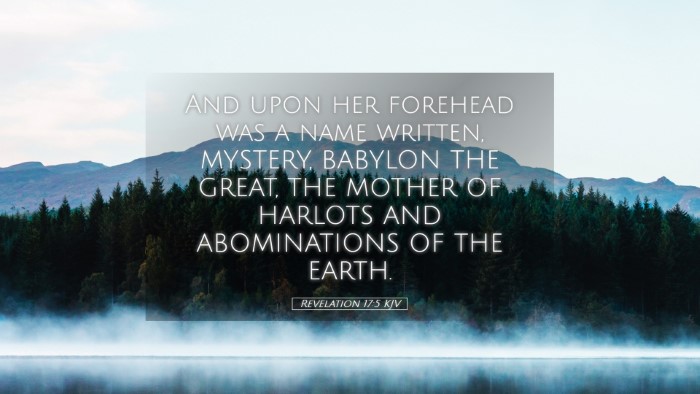Commentary on Revelation 17:5
Verse: "And upon her forehead was a name written, MYSTERY, BABYLON THE GREAT, THE MOTHER OF HARLOTS AND ABOMINATIONS OF THE EARTH."
Introduction
This verse depicts a significant element of the apocalyptic literature found in the Book of Revelation. The imagery presented here serves to encapsulate the identity and influence of a prominent figure often interpreted as the corruption of faith and the embodiment of idolatrous practices. Understanding this verse requires careful examination of the symbolism and historical implications inherent in the text.
Symbolism of 'Mystery'
The term "MYSTERY" indicates that there is a deeper significance hidden within this figure of Babylon. According to Matthew Henry, mysteries in Scripture often denote truths that are not immediately obvious to the casual observer. This term implies that there is a profound reality underlying the external appearances of the presented entity, challenging believers to seek wisdom and discernment in their spiritual journey.
Babylon as a Metaphor
Babylon, historically a formidable empire, serves as a potent symbol of human rebellion against God. Albert Barnes notes that throughout biblical history, Babylon epitomizes apostasy, pride, and immorality. By invoking Babylon, the text communicates a warning against the seductive allure of worldly power and the associated moral decay, encouraging readers to remain vigilant against similar influences in their own context.
The Mother of Harlots
Referring to the figure as "THE MOTHER OF HARLOTS" indicates her role as the progenitor of falsehoods and immoral practices. Adam Clarke elaborates on this, emphasizing that this title underscores the proliferation of idolatry and sinful behavior originating from this influence. She is not isolated in her urges; rather, she is the source through which numerous forms of wickedness proliferate across different cultures and communities.
Abominations of the Earth
The phrase "AND ABOMINATIONS OF THE EARTH" further extends the depiction of this entity’s vile nature. Matthew Henry emphasizes how abominations are acts and practices that are despised by God. This highlights not only the gravity of the sins associated with Babylon but also the divine judgment that such utter rebellion will inevitably encounter. It is also a reflection of the spiritual decay rampant in a society that drifts from righteous principles.
Scriptural Context and Interpretation
Within the broader narrative of Revelation, this verse emphasizes the contrasting themes of faithfulness and unfaithfulness. Albert Barnes references the stark juxtaposition between the Bride of Christ and this harlot, urging readers to identify themselves with holiness and purity rather than compromise and disobedience. Engaging with such contrasting images can fortify the believer’s resolve to remain steadfast amidst societal pressures.
Theological Implications
This verse brings to light theological discussions about the nature of sin and idolatry. As Adam Clarke implies, the church today must recognize the continued presence of “Babylonian” influences which tempt believers into immoral alliances and distractions from divine calling. Understanding the implications of "Babylon" in our context challenges contemporary faith communities to examine their own practices, affiliations, and values in light of scripture.
Application for Believers
- Vigilance Against Compromise: Believers are called to remain vigilant against the insidious nature of worldly values that are contrary to biblical teachings.
- Quest for Understanding: As the term "MYSTERY" suggests, seeking deeper understanding through prayer and study of God's word is essential for spiritual growth.
- Seek Purity: The imagery of the faithful church versus the harlot urges Christians to seek purity in their relationships, both with God and with one another.
Conclusion
Revelation 17:5 serves as a stark reminder of the spiritual realities underpinning human society, encouraging reflection on the broader systems at play that often lead individuals away from God's truth. The amalgamation of insights from Matthew Henry, Albert Barnes, and Adam Clarke illuminates the complexity of this verse and its applications for believers today. As we engage with such profound spiritual truths, we are called to maintain our commitment to righteousness in an age rife with temptations reminiscent of Babylon.


